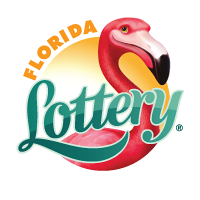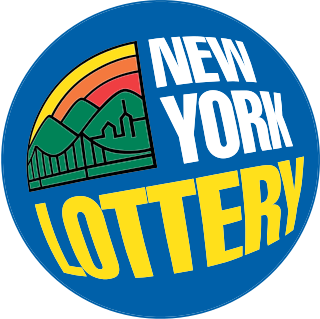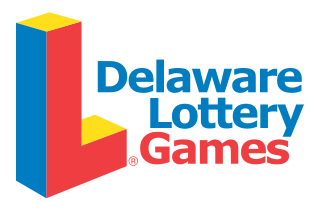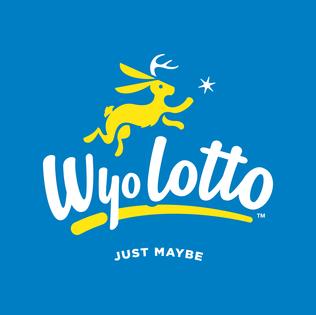
Mega Millions is an American multijurisdictional lottery game; as of June 30, 2023, it is offered in 45 states, the District of Columbia, and the U.S. Virgin Islands. The first Mega Millions drawing was in 2002. What is now Mega Millions initially was offered in six states; the logo for all versions of the game following the retirement of The Big Game name featured a gold-colored ball with six stars to represent the game's initial membership, although some lotteries insert their respective logos in the ball.
Powerball is an American lottery game offered by 45 states, the District of Columbia, Puerto Rico and the U.S. Virgin Islands. It is overseen by the Multi-State Lottery Association (MUSL), which also manages other large jackpot games such as the Mega Millions. Drawings are held three times weekly on Mondays, Wednesdays, and Saturdays at 10:59 p.m. Eastern Time, at the Florida Lottery's headquarters in Tallahassee.

The Georgia Lottery Corporation, known as the Georgia Lottery, is overseen by the government of Georgia, United States. Headquartered in Atlanta, the lottery takes in over US$1 billion yearly. By law, half of the money goes to prizes, one-third to education, and the remainder to operating and marketing the lottery. The education money funds the HOPE Scholarship, and has become a successful model for other lotteries, including the South Carolina Education Lottery.

The Florida Lottery is the government-operated lottery of the U.S. state of Florida. As of 2022, the lottery offers eleven terminal-generated games: Cash4Life, Mega Millions, Powerball, Florida Lotto, Pick 2, Pick 3, Pick 4, Pick 5, Fantasy 5, Cash Pop, and Jackpot Triple Play. A player must be 18 or older to play.
Tri-State Lottery is the terminal-generated game series offered by the Maine, New Hampshire, and/or Vermont lotteries. It was the first multi-jurisdictional lottery. Its first multi-state game came in September 1985. The compact includes five games: Megabucks ; Pick 3 and Pick 4, Gimme 5, and Fast Play ; the latter are games that differ among the three states.
The Oregon Lottery is run by the government of the U.S. state of Oregon. It is a member of the Multi-State Lottery Association (MUSL).

The New York Lottery is the state-operated lottery in the US state of New York that began in 1967. As part of the New York State Gaming Commission, it provides revenue for public education and is based in Schenectady.

The Multi-State Lottery Association (MUSL) is an American non-profit, government-benefit association owned and operated by agreement of its 34-member lotteries. MUSL was created to facilitate the operation of multi-jurisdictional lottery games, most notably Powerball.
The Maine Lottery is run by the government of Maine. It is a member of the Multi-State Lottery Association (MUSL), whose flagship game is Powerball. It was founded in 1974 after being approved through a voter referendum.
The New Hampshire Lottery was established in 1964, making it the third-oldest lottery in the United States, and the oldest in the contiguous United States. New Hampshire's lottery games include Lucky for Life, Mega Millions, Powerball, Tri-State Megabucks Plus, and numerous scratch tickets. All New Hampshire Lottery games require players to be at least 18 years old.
The Arizona Lottery is a state agency of Arizona in the southwest United States. It is a member of the Multi-State Lottery Association (MUSL). Lottery draw games include Mega Millions, Powerball, The Pick, Triple TwistFantasy 5, and Pick 3. A variety of instant scratch tickets, or Scratchers, are also offered.

The Delaware Lottery is run by the government of Delaware. Its creation was authorized by the state legislature on May 31, 1974. Its "traditional" games include Play 3, Play 4, Multi-Win Lotto, Lucky For Life, Lotto America, Mega Millions, and Powerball. Delaware also offers Keno, sports betting, and video lottery.
The Louisiana Lottery Corporation (LLC) is a government-run lottery that is used to generate revenue without increasing taxes. The proceeds of the Lottery go to the Minimum Foundation Program that funds public education in Louisiana. The daily activities involved with running the cooperation are handled by the president of the Louisiana Lottery Cooperation. The president is under the supervision of the Lottery's nine-member governing board of directors.
The Missouri Lottery is the state-run lottery in Missouri. It is a charter member of the Multi-State Lottery Association (MUSL). As of 2022, the lottery offers Powerball, Mega Millions, Cash4Life, Lotto, Show Me Cash, Pick 4, Pick 3, Cash Pop, Club Keno, scratchers, and pull-tabs. The minimum age to buy a ticket is 18.

The Nebraska Lottery is run by the government of Nebraska. It was established by the state legislature in 1993. It is a member of the Multi-State Lottery Association (MUSL). Its games include Mega Millions, Powerball, 2by2, Nebraska Pick 5, Pick 3, and MyDaY. The minimum age to purchase Nebraska Lottery tickets is 19. Elsewhere in the United States, the minimum age to buy lottery tickets is either 18 or 21.
The Wisconsin Lottery is run by the Wisconsin Department of Revenue and was authorized in 1988 by the state legislature. It is a member of the Multi-State Lottery Association (MUSL). Its games consist of Mega Millions, Powerball, Megabucks, Supercash!, Badger 5, Pick 3, Pick 4, All or Nothing, and scratch games. Since its founding, it has generated $4.6 billion for property tax relief for state residents.

The Colorado Lottery is run by the state government of Colorado. It is a member of the Multi-State Lottery Association(MUSL).
The Virginia Lottery is an independent agency of the Commonwealth of Virginia. It was created in 1987 when Virginians voted in a statewide referendum in favor of a state lottery. The first ticket was sold on September 20, 1988. All profits from Virginia Lottery ticket sales go to K-12 public education, as required by Virginia's constitution. In Fiscal Year 2022, the Lottery's profits totaled more than $779.6 million, accounting for approximately 10 percent of school funding in Virginia. That brought total Lottery profits in Virginia to more than $14.5 billion.
The Vermont Lottery began fiscal operations as an enterprise fund in October 1977, following a 1976 referendum, and the enactment of Public Act No. 82 by the 1977 General Assembly. It is run by the Vermont Lottery Commission, which is headquartered in Berlin. Along with Maine and New Hampshire, Vermont is a member of the Tri-State Lottery.

The Wyoming Lottery Corporation, branded as WyoLotto, is a lottery based in Cheyenne, Wyoming that began its operations on July 1, 2013. The Wyoming Lottery Corporation is governed by a nine-member board of directors, with each member selected by the Wyoming Governor, Matt Mead. Jon Clontz, former Oregon State Lottery COO was selected to be the Wyoming Lottery's first CEO.









